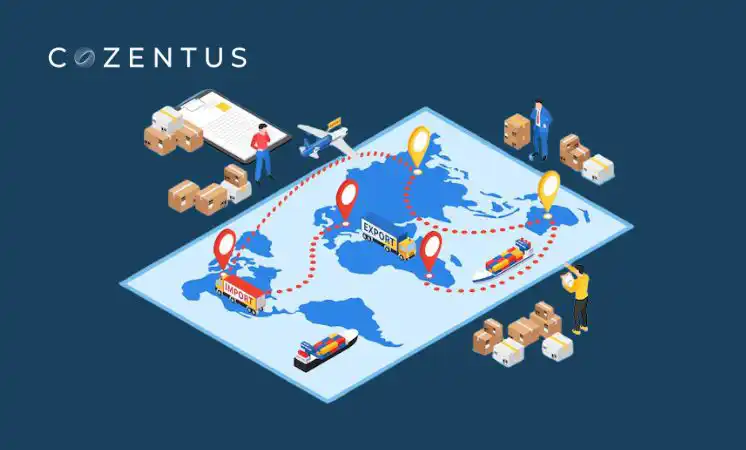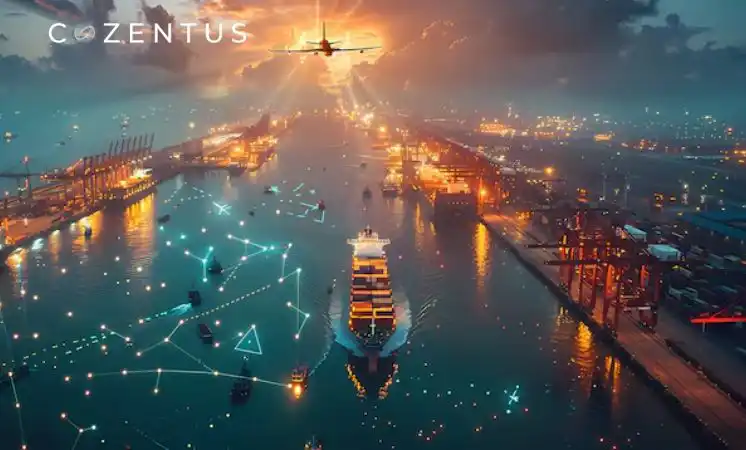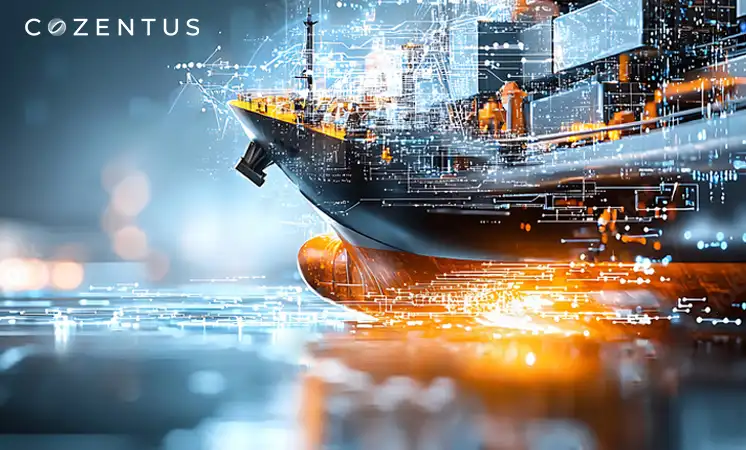
Did you know that 80% of global trade is carried out by sea? However, there are more and more disruptions to the maritime sector, such as harsh weather and port congestion. According to recent statistics, port congestion alone has resulted in up to 30% global shipping delays. It's harder than ever for supply chain managers to navigate these disruptions. In the face of such uncertainty, how can businesses continue to expand and be resilient?
To succeed in the face of these challenges, supply chain industry business executives need to have robust, flexible plans. At Cozentus, we provide supply chain leaders with a distinctive strategy and cutting-edge technologies to successfully manage disruptions in the maritime sector and guarantee long-term success.
This blog will guide you through understanding key disruptions, their impacts, and actionable strategies to overcome these challenges.
Keep reading to learn more!
Understanding Supply Chain Disruptions in the Maritime Industry
There are a lot of disruptions in the maritime business, which can come from both internal and external sources. Some of the main disruptions and their reasons are listed below:
1. Port Congestion and Capacity Constraints
With the rise in demand for goods, many ports are operating beyond their capacity, leading to congestion. Port congestion leads to delays in unloading cargo, which affects the entire supply chain. Inefficient scheduling and a lack of digitization in port operations also contribute to capacity issues.
2. Geopolitical Tensions and Regulatory Changes
Trade wars, sanctions, political instability, and changes in regulations can lead to significant supply chain disruptions. The maritime industry, being global in nature, is highly sensitive to such disruptions, affecting shipping routes, tariffs, and customs clearance processes.
3. Extreme Weather Events and Environmental Challenges
Climate change is directly impacting the maritime industry, with extreme weather events such as hurricanes, typhoons, and rising sea levels disrupting shipping routes and port operations. Environmental regulations related to carbon emissions are also evolving, requiring compliance that could lead to increased costs.
4. Labor Shortages and Strikes
Labor shortages, crew strikes, and a lack of skilled workers are frequent issues that impact the maritime industry. These disruptions can lead to delays in cargo handling, vessel turnaround times, and can ultimately delay deliveries to end customers.
5. Volatility in Demand
The unpredictability of consumer demand adds an extra layer of complexity. Sudden spikes in demand, such as those seen during the COVID-19 pandemic, can strain the entire supply chain. Conversely, low demand can lead to underutilized capacity and increased costs.
6. Technological Limitations
Many companies in the maritime industry still rely on manual processes for critical operations such as documentation, tracking, and cargo handling. This lack of digital infrastructure contributes to inefficiencies and increases vulnerability to disruptions.
Impact of Disruptions on the Maritime Supply Chain
These disruptions have far-reaching impacts. It includes,
- Delays in Delivery: Port congestion, labor shortages, and adverse weather can lead to shipment delays, affecting the entire supply chain.
- Increased Costs: Inefficiencies and additional regulatory compliance contribute to rising operational costs.
- Inventory Shortages: Disruptions can lead to stockouts and inventory shortages, affecting production schedules and customer satisfaction.
- Reputation Risks: Inability to deliver goods on time damages customer relationships and can tarnish a company's reputation.
In response to these challenges, supply chain leaders must adopt innovative solutions and strategies to minimize the impact of disruptions. Companies need to provide cutting-edge solutions that can help mitigate these challenges and ensure the resilience of maritime supply chains.
Top Emerging Trends Transforming Maritime Transportation

In the face of growing disruptions, several emerging trends are reshaping maritime transportation and offering solutions to the industry's challenges. Here, we explore the top trends transforming the maritime industry and how they contribute to navigating supply chain disruptions.
1. Digital Transformation and Automation
Digital transformation is at the forefront of maritime transportation. The adoption of technologies like Internet of Things (IoT), Artificial Intelligence (AI), and Robotic Process Automation (RPA) has streamlined processes and improved operational efficiency.
2. Artificial Intelligence and Predictive Analytics
AI is transforming maritime transportation by offering predictive insights for demand forecasting, route optimization, and risk management.
3. Sustainable Shipping Practices: Meeting Regulatory and Environmental Demands
The marine industry is moving toward more environmentally friendly methods due to the International Maritime Organization (IMO) establishing strict emission reduction targets.
4. Cybersecurity: Protecting Maritime Operations in a Digital World
Cyber threats are becoming more common as maritime transportation gets more digitalized. Data leaks and ransomware attacks have made cybersecurity a top priority for transportation firms.
5. Advanced Analytics and Predictive Maintenance: Proactive Asset Management
In maritime transportation, predictive maintenance powered by modern analytics is going to transform the game.
How Cozentus Helps Supply Chain Leaders Navigate Disruptions
Cozentus understands the unique challenges the maritime industry faces and offers comprehensive solutions to tackle them. Our approach focuses on leveraging technology, data, and domain expertise to provide end-to-end visibility, improved efficiency, and increased resilience.
1. Enhancing Visibility with Real-Time Shipment Tracking
One of the major challenges faced by maritime supply chains is the lack of real-time visibility into cargo movement. Cozentus offers a real-time shipment tracking solution that allows supply chain leaders to monitor vessel locations, predict arrival times, and gain insights into potential delays. Our solution provides:
End-to-End Visibility: Our platform integrates data from various stakeholders—ports, carriers, customs authorities, etc.—to provide an end-to-end view of cargo movement.
Proactive Decision-Making: With predictive analytics, supply chain leaders can foresee delays and take proactive actions to mitigate their impact.
Improved Customer Satisfaction: Customers are informed about their shipments' status, helping them plan their operations better, thereby improving customer satisfaction. Our AI-powered solutions include:
2. Leveraging AI and Advanced Analytics for Predictive Insights
At Cozentus, we harness the power of AI and advanced analytics to provide predictive insights that help supply chain leaders make data-driven decisions.
Demand Forecasting: By analyzing historical data and external factors, such as weather and market trends, we can help predict demand accurately, allowing for better planning of shipping schedules.
Route Optimization: AI-powered route optimization helps minimize disruptions by identifying the most efficient routes, considering weather conditions, port congestion, and other factors.
Predictive Maintenance: Our solutions provide predictive insights into vessel maintenance needs, reducing unexpected breakdowns and enhancing overall efficiency.
3. Automation for Efficient Document Processing
The maritime industry is notorious for its complex paperwork and regulatory requirements, which are often prone to errors and delays. Cozentus provides Intelligent Document Processing (IDP) solutions that automate the extraction, validation, and processing of documents like bills of lading, customs forms, and shipping manifests. This leads to:
Reduced Errors: Automation minimizes human errors, ensuring accurate documentation and regulatory compliance.
Increased Speed: Document processing times are significantly reduced, allowing for faster clearance and cargo movement.
Cost Savings: By reducing manual intervention, companies save on labor costs and avoid penalties for incorrect documentation.
4. Implementing a Resilient Supply Chain with Advanced Risk Management
Risk management is key to handling supply chain disruptions. Cozentus offers a comprehensive risk management framework that includes risk identification, scenario planning, and adaptive decision-making.
Risk Identification and Assessment: Our platform identifies potential risks, such as geopolitical tensions, adverse weather, and labor issues, and assesses their impact on the supply chain.
Scenario Planning: Using data analytics, we help leaders simulate different disruption scenarios and develop effective contingency plans.
Adaptive Decision-Making: By continuously monitoring risks, our solutions enable adaptive decision-making that helps maintain the resilience of the supply chain in the face of disruptions.
5. Optimizing Port Operations with Digital Twins
Digital twins are virtual replicas of physical assets and processes that help optimize operations and predict outcomes.
Port and Yard Management: By creating digital replicas of port and yard facilities, we can identify inefficiencies, optimize cargo handling, and minimize delays.
Capacity Planning: Our solutions help ports plan their capacity based on incoming cargo and available resources, reducing congestion and improving operational efficiency.
Scenario Testing: Ports can test different scenarios, such as increased cargo volume or labor shortages, and develop contingency plans accordingly.
6. Supply Chain Collaboration Platform
Effective collaboration is essential for mitigating the impact of disruptions. Cozentus offers a cloud-based supply chain collaboration platform that connects stakeholders across the maritime supply chain:
Streamlined Communication: The platform enables seamless communication among shipping lines, port authorities, customs, and shippers, reducing information gaps.
Real-Time Updates: Stakeholders receive real-time updates on cargo movement, changes in schedules, and regulatory requirements, ensuring everyone is on the same page.
Data-Driven Collaboration: By sharing data in real time, stakeholders can collaborate on contingency plans, allocate resources efficiently, and minimize the impact of disruptions.
7. Sustainable and Environmentally Friendly Solutions
Cozentus is committed to sustainability and helps maritime companies comply with environmental regulations:
Carbon Footprint Analysis: We provide analytics to assess and reduce the carbon footprint of maritime operations, enabling compliance with environmental regulations.
Fuel Optimization: Our AI-driven solutions help optimize fuel consumption by providing insights into vessel speed and route selection, minimizing emissions.
Green Shipping Initiatives: We work with companies to implement green shipping practices, such as slow steaming and alternative fuels, ensuring compliance with regulatory requirements and enhancing brand image.
Case Study: A Real-World Application of Cozentus Solutions
Let’s look at how Cozentus helped a global shipping company navigate disruptions:
Challenge: The company faced significant delays due to port congestion and struggled with inefficient document processing, leading to increased operational costs.
Solution: Cozentus implemented real-time shipment tracking and IDP solutions. With real-time tracking, the company was able to reroute vessels based on congestion forecasts, reducing delays. IDP automated the documentation process, improving accuracy and reducing processing times.
Results: The company achieved a 25% reduction in average shipment delays, a 30% decrease in document processing costs, and significant improvements in customer satisfaction.
Building Resilience: Strategies for Retail, Manufacturing & Logistics Business Leaders
While the maritime industry faces unique challenges, supply chain disruptions are also prevalent in retail, manufacturing, and logistics businesses. Strategies such as enhancing visibility, predictive analytics, automation, and scenario planning are crucial across these sectors.
1. Navigating SC Disruptions in Retail:
To ensure continuity and long-term success, retail businesses must be proactive in strengthening their supply chains disruptions.
Business Strategies:- Diversify suppliers and sourcing locations
- Leverage technology for Real-Time visibility
- Utilize predictive analytics for demand forecasting
- Automate supply chain processes
- Leverage AI for personalized customer experiences
- Invest in risk monitoring tools
2. Navigating SC Disruptions in Manufacturing:
Leaders in the manufacturing supply chain can develop resilience to make sure that their operations can withstand a range of disruptions and adjust accordingly, all the while retaining productivity and efficiency.
Business Strategies:- Embrace technology and automation
- Diversify suppliers and geographical sources
- Implement agile supply chain practices
- Enhance data analytics capabilities
- Focus on supplier relationships and collaboration
- Invest in employee training and development
- Utilize Real-Time monitoring and visibility tools
3. Navigating SC Disruptions in Logistics:
Leaders in the logistics supply chain need to put resilience first to handle disruptions well. They may improve their operations and guarantee business continuity and long-term success by implementing proactive measures and utilizing technology.
Business Strategies:- Enhance supply chain visibility
- Leverage advanced technology
- Develop contingency plans
- Foster collaborative partnerships
- Diversify suppliers and transportation routes
- Embrace sustainability practices
- Utilize data-driven decision making
- Encourage a culture of resilience
- Invest in infrastructure and resources
Conclusion

The maritime industry faces a complex and dynamic environment, with disruptions posing significant challenges to the supply chain. However, with the right strategies, technology, and collaboration, business leaders can not only navigate these disruptions but also turn them into opportunities for growth.
At Cozentus, our comprehensive solutions empower supply chain leaders to enhance visibility, improve efficiency, and build resilience against disruptions. Whether it is leveraging AI and advanced analytics for predictive insights, automating processes for increased accuracy, or optimizing port operations with digital twins, our approach is tailored to help businesses succeed in the face of adversity.
If you’re a supply chain leader in the maritime industry looking to navigate disruptions and achieve long-term success, Cozentus is here to support you every step of the way.
Ready to Navigate Maritime Supply Chain Disruptions? Read more about us today to learn how our solutions can help your business thrive despite challenges.
Recent Post
Subscribe to our newsletter
Stay updated on latest trends and news in the supply chain and logistics industry
Join our mailing list for monthly updates
Download Reports
AI-Powered Intelligent Document Processing -Your Launchpad to Digital Transformation
Download







